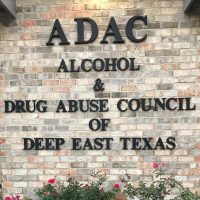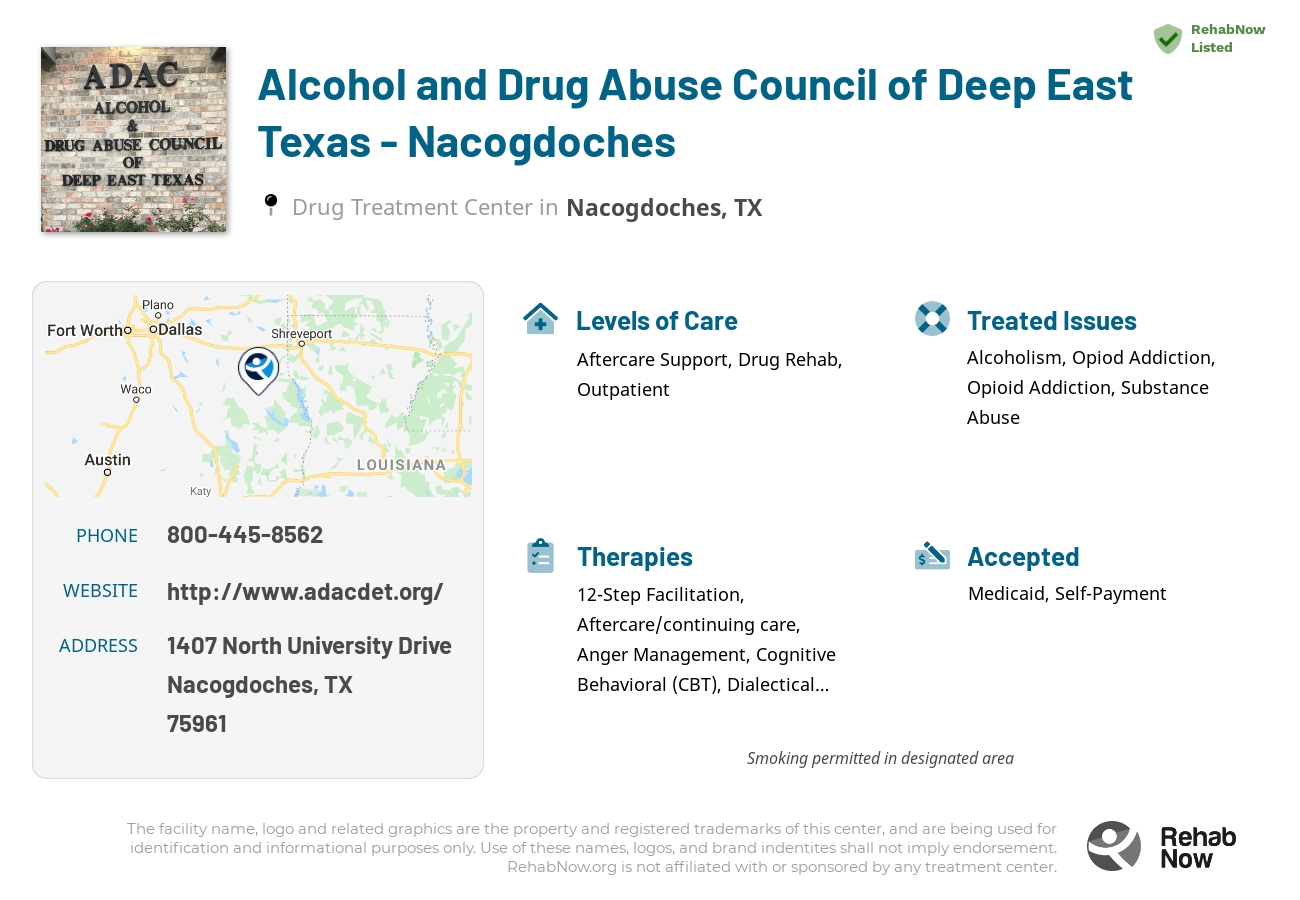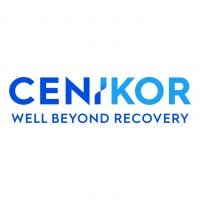About Alcohol and Drug Abuse Council of Deep East Texas in Texas
At the Alcohol and Drug Abuse Council of Deep East Texas in Nacogdoches, Texas, individuals struggling with addiction issues find a supportive environment for recovery. This facility stands out for its commitment to professional and compassionate services aimed at combating substance misuse through outpatient programs. Here, both individual and group therapies are tailored to address the unique needs of adults seeking sobriety, ensuring a path to recovery that's both accessible and effective.
- Customized Care: Each client’s program duration and intensity are determined based on regular assessments by clinical staff, ranging from 3 to 6 months.
- Affordable Treatment Options: A “Financial Eligibility” form is completed to ascertain applicable fees, making the treatment accessible to those in need.
- Comprehensive Therapy Sessions: Offers 1 to 2 individual sessions per month and 1 to 2 education and group therapy sessions per week, allowing for a balanced and supportive recovery process.
Accredited with a State License, the Alcohol and Drug Abuse Council of Deep East Texas adheres to high standards of care and professionalism. Their outpatient program is specifically designed to assist adults in overcoming addiction, with a financial eligibility process in place to ensure affordability. The varied session frequency offers multiple touchpoints for support and education, aiding in a sustainable recovery journey.
Focusing on alcoholism, opioid addiction, and substance abuse, the treatment methods include a blend of individual and group therapy to address the underlying issues of addiction and foster healthy coping mechanisms. The facility is dedicated to providing a level of care that facilitates lasting sobriety and personal growth for each person who walks through their doors.
Genders
Ages
Modality
Additional
Conditions and Issues Treated
It’s not easy getting sober on one’s own, or even going to rehab and escaping the grasp of addiction by oneself. Substance abuse treatment gives addicts a place to stay sober while learning what it takes to quit for good. They will learn from others about what works and what doesn’t work with remaining drug-free.
Treatment centers such as Alcohol and Drug Abuse Council of Deep East Texas focus on the needs of individual addicts to heal them. There is a combination of physical and mental therapies that treat the root cause of the addiction, whether it be family problems, stress, or past traumatic events.
The final benefit of substance abuse treatment is introducing new people who can help in your recovery after you leave Alcohol and Drug Abuse Council of Deep East Texas. Through group therapy sessions with other addicts and attending support meetings once a day, a person will learn how to interact with others and cope with cravings. This is a chance for you to rebuild your social circle healthily after you leave treatment.
Opioid addiction starts when a person becomes addicted to legal or illegal opioids. The addiction can happen quickly, in just a matter of days. Opioid withdrawal can be extremely uncomfortable and lead the user to continue to use even if they want to quit. Stopping using an opioid requires medical observation. Sometimes inpatient treatment with a medically supervised detox is necessary for managing the withdrawal process while learning lasting tools for maintaining recovery. Medications may be used in some cases of opioid addiction.
Opioid addiction is one of Texas‘s most prominent forms of addiction. It’s treated by detoxifying the body so that the chemicals from the medications no longer impact them and by therapies to correct behavior and target the root of the problem.
Levels of Care Offered
This center offers a variety of custom treatment tailored to individual recovery. Currently available are Outpatient, Residential, with additional therapies available as listed below.
Outpatient treatment is considered the lower intensity level of addiction treatment. It’s ideal for early phase addiction or lower intensity addictions. It may include weekly sessions instead of daily. It may include weekly sessions instead of daily. Peer group support, 12-step programs, and individual counseling may still be involved but at a lesser frequency than an intensive outpatient program. It is a good choice for someone who doesn’t need to go through a medically supervised detox and who has a supportive home environment. It requires motivation and dedication to commit to the program without constant monitoring.
Residential treatment programs are those that offer housing and meals in addition to substance abuse treatment. Rehab facilities that offer residential treatment allow patients to focus solely on recovery, in an environment totally separate from their lives. Some rehab centers specialize in short-term residential treatment (a few days to a week or two), while others solely provide treatment on a long-term basis (several weeks to months). Some offer both, and tailor treatment to the patient’s individual requirements.
Therapies & Programs
Individual therapy involves one-on-one sessions between the patient and therapist. It provides patients with a safe environment to openly discuss personal and sensitive issues with the therapist. They find the therapist as someone they can trust. Individual therapy aims to identify the core issues that would have led the patient to substance abuse and address them effectively. The therapist can develop patient-specific customized solutions through individual therapy, which aids speedier recovery.
Groups typically involve meetings with other recovering addicts who can relate to one another’s experiences. They might meet in person or online and typically focus on the process of staying sober rather than overcoming a specific addiction.
In these groups managed by Alcohol and Drug Abuse Council of Deep East Texas, addicts can build a sense of community and develop strong emotional connections with others who understand what they are going through. These beneficial relationships can help addicts overcome their cravings and prevent relapse at any point during the recovery process.
Dialectical Behavior Therapy (DBT) is a type of therapy created in the late 1980s and early 1990s to help people with high rates of suicidal behavior. DBT helps people learn how to live a life that is no longer controlled by overwhelming emotions and urges. It is beneficial in treating drug addiction because it helps patients understand and cope with their cravings for drugs or alcohol rather than turning to those substances as a way of coping.
There is hope for people who are addicted to drugs and alcohol. Cognitive Behavioral Therapy (CBT) is the solution. CBT focuses on the underlying thoughts and behaviors that caused the addiction problem in the first place and may cause a relapse. This type of psychotherapy addresses negative feelings common in substance abuse disorders. It helps to change them by restructuring thought patterns. It’s about removing negative thoughts and providing long-term benefits while promoting self-awareness, self-control, and healthy ways to respond to negative thoughts. These sessions can be done by themselves or as part of combination therapy.
Eye Movement Desensitization and Reprocessing (EMDR) is a treatment method that can help reduce the impact of traumatic memories on emotions. It does this by having patients follow a bar of light or watch their therapist’s finger move back and forth, which mimics the eye movements of REM sleep.
This allows the brain to reprocess the memories, reducing their impact. EMDR therapy is different from traditional therapies in that it addresses the root cause of substance abuse in many patients. This is done by combining EMDR therapy with behavioral therapies. This treatment option offered by Alcohol and Drug Abuse Council of Deep East Texas can help patients who turn to drugs to escape painful memories.
Payment Options Accepted
For specific insurance or payment methods please contact us.
Alcohol and Drug Abuse Council of Deep East Texas Associated Centers
Discover treatment facilities under the same provider.
- ADAC in Jasper, TX
- Alcohol and Drug Abuse Council of Deep East Texas in Livingston, TX
- Alcohol and Drug Abuse Council of Deep East Texas in Lufkin, TX
- Alcohol and Drug Abuse Council of Deep East Texas - Livingston in Livingston, TX
- Alcohol and Drug Abuse Council of Deep East Texas - Lufkin in Lufkin, TX
Learn More About Alcohol and Drug Abuse Council of Deep East Texas Centers
Additional Details
Specifics, location, and helpful extra information.
Nacogdoches, Texas 75961 Phone Number(800) 445-8562 Meta DetailsUpdated April 15, 2024
Staff Verified
What else do people call Alcohol and Drug Abuse Council of Deep East Texas?
People have occasionally also searched for “Alcohol and Drug Abuse Council of Deep East Texas in Texas”
Alcohol and Drug Abuse Council of Deep East Texas Patient Reviews
There are no reviews yet. Be the first one to write one.
Nacogdoches, Texas Addiction Information
Texas is one of the primary hubs for drug smuggling into the country. The border between Texas and Mexico is more than 1,000 miles long. More than 10 million residents use alcohol every year and more than 25% of those are minors. Alcohol and drug use has become so common in Texas that almost 15% of all deaths can be attributed to these substances.
In Nacogdoches, Texas, 9.5% of people reported using illicit drugs recently. More than 10% of high school students reported currently using an illicit drug. Among adults who use drugs in the state, over 60% started using before they turned 18. Drug treatment in Nacogdoches, TX, can be expensive, but many facilities offer scholarships or sliding-scale payment plans.
Treatment in Nearby Cities
- Baytown, TX (131.6 mi.)
- Decatur, TX (205.2 mi.)
- Spring Branch, TX (255.6 mi.)
- Canyon Lake, TX (246.7 mi.)
- Morgan, TX (176.7 mi.)
Centers near Alcohol and Drug Abuse Council of Deep East Texas
The facility name, logo and brand are the property and registered trademarks of Alcohol and Drug Abuse Council of Deep East Texas, and are being used for identification and informational purposes only. Use of these names, logos and brands shall not imply endorsement. RehabNow.org is not affiliated with or sponsored by Alcohol and Drug Abuse Council of Deep East Texas.









